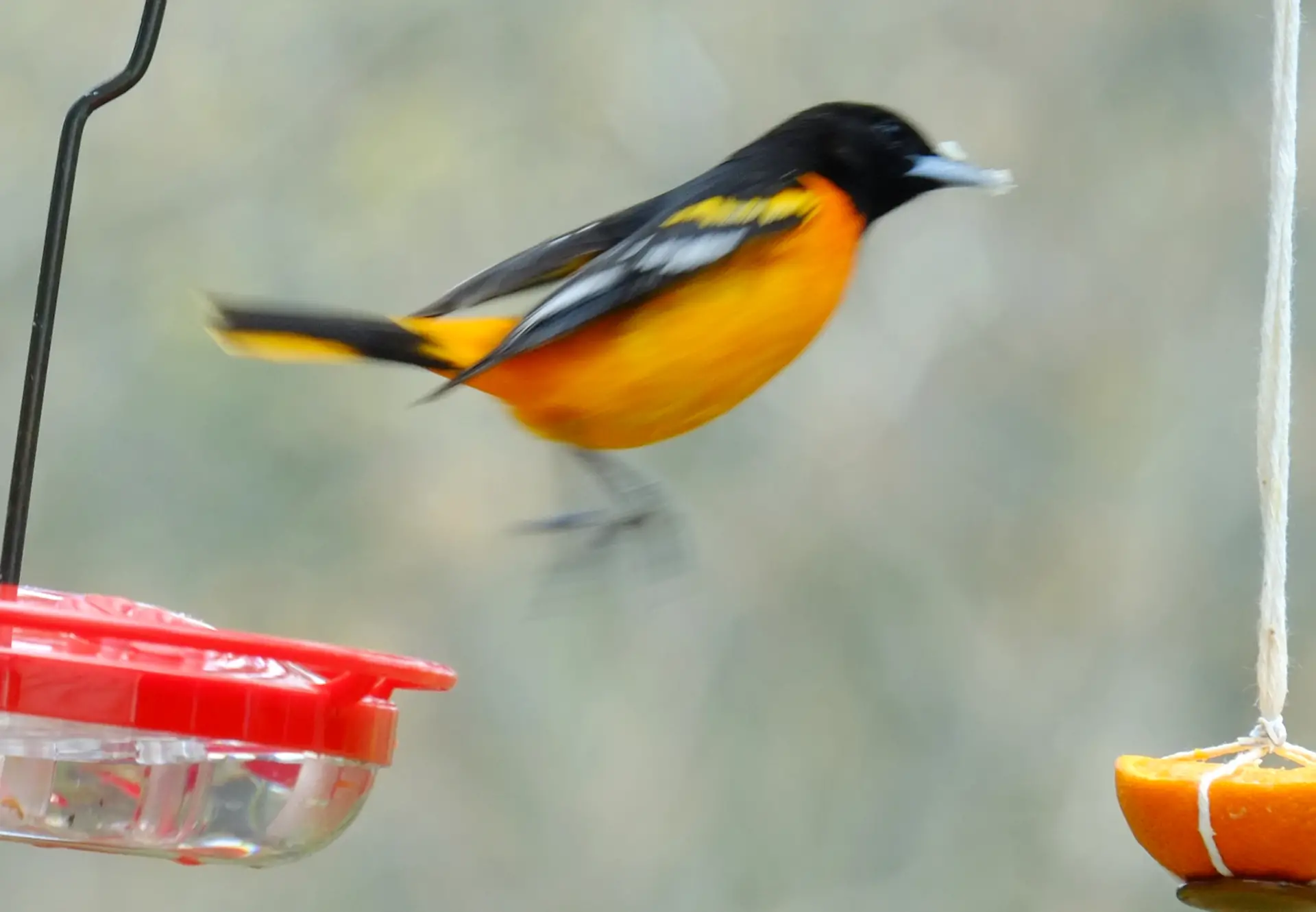In May 2020, word went out that gangs of Baltimore Orioles had invaded Massachusetts. Fresh citrus is one of the birds’ favorite treats, and as you see, I strung a chunk of mandarin orange out near our hummingbird feeder.
Then, I slapped a Fuji 55-200 zoom on my X-Pro1, mounted it on a tripod in our dining room, screwed a long release cable into the shutter button, manually focused the lens on the fruit, and sat down for a vigil.
A “Pre-Decisive” Moment
Before long, an oriole landed on the hummingbird feeder. If the bird flew over to the fruit, I’d have one chance to get an action shot. So with my thumb poised on the release cable, I relaxed into a calm awareness.
Instead of flying, though, the oriole jumped. But with a seeming mind of its own, my thumb had already pushed the release plunger before the bird had even moved or my mind had thought to shoot. With its shutter already opening onto the bird’s instantaneous hop, the camera caught it suspended in midair.
It wasn’t a “decisive” moment, like Cartier-Bresson’s classic image of a man leaping over a puddle. My thumb took the shot before I’d even had a chance to decide to. The photo was actually “pre-decisive”!
Strange Science
That might sound a bit “woo-woo mystical,” but science could have an explanation. Over the past few decades, neuroscientists have discovered strange– almost “paranormal”– things about our brains. One in particular seems to apply to this story. A 2008 study– led by neuroscientist John-Dylan Haynes, at the Bernstein Center for Computational Neuroscience in Berlin– concluded that (in his words):
“Our decisions are predetermined unconsciously a long time before our consciousness kicks in.”
And by “a long time” he meant up to seven seconds before we are even aware of wanting to take action… or why. For a “computer” as fast as our subconscious brain, seven seconds is nearly an eternity.
This controversial idea has raised a deeper question that Haynes and other scientists are now exploring– whether what we call “free will” even exists. To do so, they’re testing whether we can consciously overrule our brains’ pre-conscious decisions once they are made.
Paradigm Shift Coming?
But I doubt that free will is in danger. Haynes and his team may have stumbled on an (admittedly odd) adaptive mechanism that naturally evolved to launch our response to dangers sooner than consciousness could. And my thumb certainly surprised me when it triggered a photo of the bird before it had even moved… and while I was calmly zenned.
The underlying mechanism behind such pre-conscious responses may be stranger still– quantum mechanics. But as scientists and the broader public learn more about the “spooky” quantum fabric on which our universe is built (and to which our brains apparently connect), so-called “paranormal” phenomena may someday be thought of as just “strangely” normal. They include (but are not limited to) ESP, precognition, telepathy, mediumship, remote viewing, out-of-body travel, bilocation, psychometry, ghosts, and– on a much smaller scale– triggering a well-timed photo before its lovely feathered subject had even twitched a muscle.
Currently, such speculations are only whispered in the back halls of science. But they may be the early ripples of a tsunamic paradigm shift that’s even now rolling toward us.
–Dave Powell is a Westford, Mass., writer and avid amateur photographer.
Share this post:









Comments
Thorsten Wulff on The Jumping Bird (A One-Shot Story) – By Dave Powell
Comment posted: 15/03/2023
Comment posted: 15/03/2023